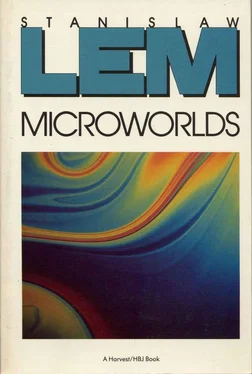Stanislaw Lem - Microworlds
Здесь есть возможность читать онлайн «Stanislaw Lem - Microworlds» весь текст электронной книги совершенно бесплатно (целиком полную версию без сокращений). В некоторых случаях можно слушать аудио, скачать через торрент в формате fb2 и присутствует краткое содержание. Город: New York, Год выпуска: 1986, ISBN: 1986, Издательство: A Harvest / HBJ Book, Жанр: Критика, на английском языке. Описание произведения, (предисловие) а так же отзывы посетителей доступны на портале библиотеки ЛибКат.
- Название:Microworlds
- Автор:
- Издательство:A Harvest / HBJ Book
- Жанр:
- Год:1986
- Город:New York
- ISBN:0-15-659443-9
- Рейтинг книги:4 / 5. Голосов: 1
-
Избранное:Добавить в избранное
- Отзывы:
-
Ваша оценка:
- 80
- 1
- 2
- 3
- 4
- 5
Microworlds: краткое содержание, описание и аннотация
Предлагаем к чтению аннотацию, описание, краткое содержание или предисловие (зависит от того, что написал сам автор книги «Microworlds»). Если вы не нашли необходимую информацию о книге — напишите в комментариях, мы постараемся отыскать её.
Microworlds — читать онлайн бесплатно полную книгу (весь текст) целиком
Ниже представлен текст книги, разбитый по страницам. Система сохранения места последней прочитанной страницы, позволяет с удобством читать онлайн бесплатно книгу «Microworlds», без необходимости каждый раз заново искать на чём Вы остановились. Поставьте закладку, и сможете в любой момент перейти на страницу, на которой закончили чтение.
Интервал:
Закладка:
Thus, science fiction takes flight from the models and methods of reasoning we have sketched here to the rigid, simplistic structures derived from fairy tales and detective novels. Because of this, the system of narrative structures generally used is muddled, and is inadequate for the futurological thematics of science fiction. In their choice of narrative structures, most science-fiction writers fail to consider any criteria of empirical adequacy for and the best possible arrangement of the objects and situations they wish to describe. They try to conceal the “dubious origin” of such structures (the detective novel, romantic stories, fairy tales), which leads to the unintentionally grotesque style characteristic of most science fiction.
The second problem of science fiction is the unresolved relationship of the narrative to phenomena that are as yet not associated with appropriate descriptive structures, since they are the first of their kind. Meetings with such unknowns at first lead inexorably to semantic-descriptive paralysis. At such times, the greatest dilemmas that humanity has, over the centuries, conquered in the course of its “natural gnoseological evolution” surface all at once. I am thinking here of the problems of categorizing and articulating new phenomena — and thus of their inclusion in the established schemes of identification and recognition — all the decisions that together give a final definition of what, precisely, a new phenomenon is, what it means, how it can be described, what ethics it implies, and so forth. Judging from the popular output, science fiction is completely unaware that such problems exist, that they must be considered and consciously and concretely resolved. If the new phenomenon is of a qualitatively different scale — contact with “aliens” in outer space, for example — it is all but certain that the repertoire of received, ready concepts will not be able to accommodate it without considerable friction. In all likelihood, a cultural, perceptual, and perhaps even a social-ethical revolution will be necessary. Thus, instead of the assimilation of the new, we must imagine the reordering and even the destruction of fundamental concepts, the revaluation of truths that were previously indisputable, and so on. To refer such phenomena to slick, closed, and completely unambiguous structures we must simply consider a flaw. We can learn which structures and methods are the most appropriate from the history of science—by examining, for instance, the vicissitudes of physics, with its whole series of conceptual-categorial revolutions. (In this sense, the completely fantastic, one-hundredpercent invented history of the “new cosmogony” would still be true to reality, at least structurally, since the succeeding conceptual orders were “turned inside out” and reordered either precisely in this way or similarly in each science’s actual course of development.)
Science fiction can thus learn from science as well as from other forms of literature, such as experimental prose. But it cannot learn through the kind of passive imitation characteristic of the English new wave of science fiction. Experimental literature, as we noted, introduces into the creative process different forms of “noise” (the chance generator), and the criteria for selecting structures created in this way are purely aesthetic. Science fiction should add to these another and separate set of criteria for cognitive adequacy. (Some equivalent to “noise” — the significant dispersion of opinions, or the contradiction arising simultaneously from the same sources — arises whenever a particular science confronts a new and unfamiliar phenomenon, and enters the phase of rapid conceptual reorganization. At the same time, this “noise” is never pure nonsense; science has not simply slipped into chaos.) Authors of science fiction must therefore draw upon the paradigmatics of transformations.
Clearheaded “internal” critics of science fiction have long been displeased with the genre for its flight from the real problems of civilization. But criticism must deal not only with the text’s relations to the external world. It must evaluate not only the structure of the things described, but also the structure of the description itself. The former generally determines the choice of themes, whereas the latter determines the sum total of the rules governing the treatment of the material — and these rules are not automatically defined by the chosen theme.
Science fiction remains mired in a stage of theoretical self-reflection similar to the aggressive, extreme reductionism of neo-positivism (“every science, from biology to psychology, must be reduced to the language of physics!”). When asked whether such a reduction is practicable or not, the enthusiastic neo-positivists answer yes, their opponents no, and that usually puts an end to the argument. The neo-positivists, amazingly, have not recognized the simple fact that the reductionist program is based on a fallacy. They wish to posit a logical dichotomy by way of exclusion of the middle, whereas the historical nature of scientific understanding does not allow such a conceptualization. Biology and psychology certainly cannot be deduced from modern physics. At the same time, we cannot be sure that the physics of the future (which cannot, in principle, be reduced to the physics of the present, just as Einstein’s model of the universe cannot be reduced to Newton’s, nor the indeterminacy of quantum physics to Laplacian determinism) might not create transitional branches that will intersect with corresponding branches of the biology or psychology of the future (general systems theory). For that matter, we might attain the synthesis in yet another way, as the cyberneticists envision it: the synthesis would come about, not on the level of particular sciences, but on the next higher level of abstraction, with the discovery of the constants common to all the branch sciences.
Science fiction is reminiscent of neo-positivism’s aggressive reductionism in that it acts as if the miserable repertoire of the detective story and the adventure novel were sufficient for structuring any phenomenon in the whole spectrum of the infinite universe, regardless of its time, place, and degree of complexity, and all the situations in which human civilization may ever find itself. Thus science fiction designates its problems (contact with aliens, the spirit in the machine, the instrumentalization of values, etc.), but it does not embody them in narrative structures.
In summary, it is clear that among the criticisms leveled against existing science fiction, the most important is this matter of opportunities systematically squandered. We must deem it a serious flaw of the genre that it has no independent, rational, and normative criticism that is neither destructive nor apologetic and that is committed not only to science fiction, but also to the more encompassing relations between culture and literature on which the fate of both depends. For this reason, my intention has not been so much to write the definitive monograph on science fiction, but, instead, to prepare the outline of a rational, internal critique.
Translated from the Hungarian by Etelka de Laczay and Istvan Csicsery-Ronay, Jr.
COSMOLOGY AND SCIENCE FICTION
These remarks owe their existence to a suggestion of Dr. R. Mullen, of Science-Fiction Studies, who received a review copy of Cosmology Now, edited by Laurie John, but felt the book too peripheral to the journal’s concerns for an ordinary review. The title, too, is Dr. Mullen’s choice. Therefore my remarks are addressed to the readers of Science-Fiction Studies, and they were written in German because my English is insufficient for the task.
1. Cosmology Now was written by several British scientists for the BBC in 1973. The American edition, the one on hand, appeared in 1976. A reviewer both well versed in the subject and malicious could claim with some justification that the book would be better called Cosmology Yesterday. If the cosmos is the most durable of things, this durability doesn’t extend to the science that deals with its exploration. Even the best cosmological reference works written some seven or eight years ago are today totally out of date. The three life-years that Cosmology Now has now had have seen much change in cosmology. Since I don’t have to write a “regular review,” I will list only the most important innovations. The age of the cosmos is today estimated to be some twenty billion years. The experiments of Weber, who claimed to have registered gravitational waves, have been discarded, since his apparatus was of insufficient sensitivity. The health of the “steady state” theory, which denies the evolution of the universe from a zero point, has deteriorated noticeably. Scientists are inclined to award the palms of victory to the theory of the Big Bang. Moreover, many of the things described in Cosmology Now have lost their former, beautiful simplicity. For instance, there is now a whole “family” of black holes. In addition to the ones postulated originally, which were supposed to be the final stage of a collapsing neutron star, there have been new ones — for instance, partially reversible black holes. These may not be assumed to be “gravity graves,” invisible for all eternity. And there are, especially, the black micro-holes. As the new theory of Stephen Hawking, of Cambridge, will have it, these are objects with the diameter of a proton and mass of a mountain range. Quite a lot of them are said to have been created at the time of the Big Bang. I mention the theory of Hawking, first, because it introduces the method of quantum mechanics into the field of the general theory of relativity, and, second, because it implies consequences that cannot be overlooked and may change our whole outlook. Although there are so far no irrefutable (empirical) proofs for the existence of any black holes, we cannot imagine any possible technological utilization of the big black holes, whereas one may consider the micro-holes as energy sources that can surpass the annihilation of matter by several million times, the so far energetically most potent reaction. Such a micro-hole is supposed to contain the energy of several million hydrogen bombs. Sapienti sat. There are other important discoveries, but I cannot enlarge this short aside into a “regular book review.” Therefore — finis.
Читать дальшеИнтервал:
Закладка:
Похожие книги на «Microworlds»
Представляем Вашему вниманию похожие книги на «Microworlds» списком для выбора. Мы отобрали схожую по названию и смыслу литературу в надежде предоставить читателям больше вариантов отыскать новые, интересные, ещё непрочитанные произведения.
Обсуждение, отзывы о книге «Microworlds» и просто собственные мнения читателей. Оставьте ваши комментарии, напишите, что Вы думаете о произведении, его смысле или главных героях. Укажите что конкретно понравилось, а что нет, и почему Вы так считаете.












